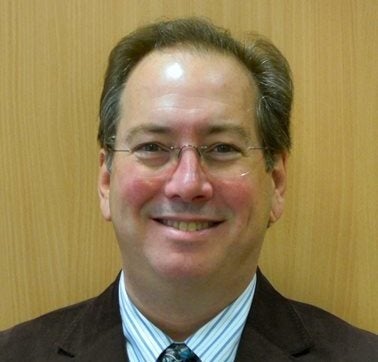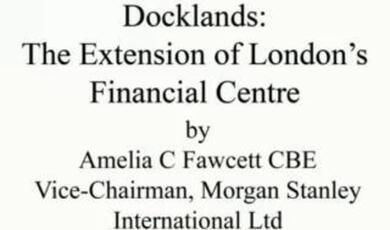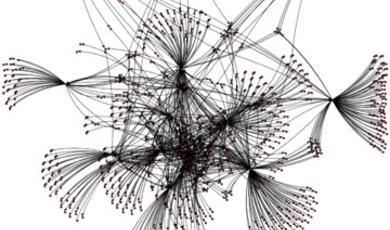Professor Michael Mainelli introduces the symposium and outlines what he sees as the four major themes of leadership: vision, popularity, integrity and power.
29 October 2012
Leading at The Top:
Power and Politics - An Introduction
Professor Michael Mainelli
Leadership has been defined as “a process of social influence in which one person can enlist the aid and support of others in the accomplishment of a common task”. Sounds great, but one of my favourite lampoons of leadership is Roger McGough’s 1937 short poem:
I wanna be the leader
I wanna be the leader
Can I be the leader?
Can I? I can?
Promise? Promise?
Yippee, I’m the leader
I’m the leader
OK what shall we do?
We live in an age of leadership. I recall vividly being asked in the 1970s to go on a leadership development course. Since then we have had chairs and institutes, courses and training, books and books and books on leadership. When the famous management professor Henry Mintzberg, in an interview for Dutch television, was asked “what would you recommend for leadership in the 21st century?” he answered, without delay or hesitation: “Less of it”.
Zen enlightenment considers satori – when everything is at once in the right place. Being completely where we are now, in the present, poised, having achieved the correct position from which we are ready to act. Duality is omnipresent in Z/Yen, as is paradox. We are to be everywhere and nowhere. One Zen populariser has a line in “wherever you go, there you are”, or as my wife somewhat uncomfortably paraphrases about me, “wherever you are, there you go!”
To get us thinking today I would like to explore that duality by juxtaposing quotes in four areas of leadership – vision, popularity, integrity, and power.
Vision
The first pair of quotations is from an economist and a general.
“All of the great leaders have had one characteristic in common: it was the willingness to confront unequivocally the major anxiety of their people in their time. This, and not much else, is the essence of leadership.”
John Kenneth Galbraith
“Never tell people how to do things. Tell them what to do and they will surprise you with their ingenuity.”
General George Patton
A variety of business thinkers promote “leadership” as a way of cutting through complex trade-offs, a tool, a device. If people “follow the leader’s example”, then they will make appropriate decisions for the organisation. This may be true, but criticising leadership as a tool of limited use is also valid. The leader can’t be everywhere. Not all decisions are suited to simple solutions. Some leadership styles may work with the front-facing parts of the organisation, e.g. projects or sales, but not with others, e.g. finance or logistics. Another set of business thinkers promotes “culture” as way of calculating trade-offs. Culture is “the way we do things around here.” Perhaps culture could be more accurately defined as “the way we decide to do things around here”. However, this means changing the culture by grabbing, changing and enforcing decisions at all levels – recruitment, procurement, investment or marketing decisions.
For me, the crucial bit of leadership is painting a vision or creating a story. One of the great things I learned in a 1992 study, "Vision into Action: A Study of Corporate Culture", Journal of Strategic Change, Vol 1, pages 189-201, John Wiley & Sons (1992), was the importance of “the crisis point as a trigger for change”. The leader sets the direction and then puts people’s backs against the wall. In line with Galbraith, I heard from 28 senior managers that as a leader, “if you don’t have a crisis, manufacture one”. A crisis point is a trigger and a justification. Crisis compels steps toward the vision the leader has painted, in line with the story he or she has told. A crisis, whether real or manufactured, creates uncertainty (if not fear) and seems to allow leaders to lever the cultural boulder that single inch that gets it moving towards change. Leadership is evaluated on whether it helps us reach our goals.
So, as a tool for crises, real or imagined, I’ll leave the last word on the tool to Patton.
“Lead me, follow me, or get out of my way.”
General George Patton
Popularity
The next pair of quotations is from a poet and a statesman.
“The leader, mingling with the vulgar host, is in the common mass of matter lost.”
Alexander Pope (1688–1744) translation of The Odyssey of Homer, Book iv, Line 397.
“The nation will find it very hard to look up to the leaders who are keeping their ears to the ground.”
Sir Winston Churchill
How often have we heard “it’s lonely at the top”. Does this matter? To some degree, leaders can only lead by being separate. But we do confuse popularity with leadership. Too often the business pages praise a “leader” when they are really praising a large-organisation bureaucrat who rose through the ranks. Equally, the business pages invest an entrepreneur with “leadership” qualities, when in reality he or she has created a successful business, all too frequently spinning out of control soon thereafter. Finally, the leader seems to be the person everyone looks too, but that may not be the person with real influence, take the case of wildly popular business people with a bit of flair or style. Quiet success and modern leadership seem to contradict one another. A true leader is unlikely to be the most popular person. Further the pursuit of popularity leads to the demise of leadership. Leadership is not evaluated by popularity, and may be less suited to modern times of instant feedback.
The last word on popularity falls to a journalist from the Algonquin Round Table:
“I cannot give you the formula for success, but I can give you the formula for failure: which is: Try to please everybody.”
Herbert B. Swope
Integrity
This pair of quotations comes from a general and an evangelist:
“A true leader has the confidence to stand alone, the courage to make tough decisions, and the compassion to listen to the needs of others. He does not set out to be a leader, but becomes one by the equality of his actions and the integrity of his intent.”
Douglas MacArthur
“People buy into the leader before they buy into the vision.”
John C. Maxwell
Integrity is often touted as the key element of leadership. That doesn’t necessarily mean integrity confers other talents. I’m often reminded of Exodus 17, 8:13:
8 Then came Am'alek, and fought with Israel in Reph'idim.
9 And Moses said unto Joshua, Choose us out men, and go out, fight with Am'alek: tomorrow I will stand on the top of the hill with the rod of God in mine hand.
10 So Joshua did as Moses had said to him, and fought with Am'alek: and Moses, Aaron, and Hur went up to the top of the hill.
11 And it came to pass, when Moses held up his hand, that Israel prevailed: and when he let down his hand, Am'alek prevailed.
12 But Moses' hands were heavy; and they took a stone, and put it under him, and he sat thereon; and Aaron and Hur stayed up his hands, the one on the one side, and the other on the other side; and his hands were steady until the going down of the sun.
13 And Joshua discomfited Am'alek and his people with the edge of the sword.
Was all that mattered that Moses led with integrity, or did Joshua’s fighting skills win the day. To paraphrase a popular saying, “If you can fake integrity, you can lead anything.” Integrity sounds great, but the case is hard to prove. Let’s leave the last word on integrity to a missionary:
“Example is not the main thing in influencing others, it is the only thing.”
Albert Schweitzer
Power
Finally power. Here I draw from a statesman and a poet.
“If your actions inspire others to dream more, learn more, do more and become more, you are a leader.”
John Quincy Adams
The poet’s contribution is often confused with a usual film suspect.
"My dear brothers, never forget, when you hear the progress of enlightenment vaunted, that the devil's best trick is to persuade you that he doesn't exist!"
Charles Baudelaire, French poet, "Le Joueur généreux," pub. February 7, 1864
Power too is a paradox, perhaps why influence is so often emphasised. The very use of power removes it. If you have power I shall give you power, but if you use it I shall take it away. Or is this a bit like John Mortlock of Cambridge, “What you call corruption, I call influence”. The very use of influence invokes a scheming to meet an end that can undermine integrity or popularity and render the tool of leadership useless. Perhaps the best and true leaders are those we don’t recognise.
The final words on power are over 2,500 years old:
To lead people, walk beside them … As for the best leaders, the people do not notice their existence. The next best, the people honor and praise. The next, the people fear; and the next, the people hate … When the best leader’s work is done the people say, ‘We did it ourselves!
Lao-Tzu
So, some musings on vision, popularity, integrity and power. Today’s event will explore leadership from a number of angles, focusing on recent contributions to aspects of leadership which management literature tends to neglect. Of particular interest will be assessing the correct balance between public leadership, the roles of power and politics in effective leadership and the limited treatment of this subject in much conventional thinking. We shall also consider who we would want to lead us, and ask whether we should offer ourselves for such roles?
So, to end the beginning, a final quotation:
“Leadership: the art of getting someone else to do something you want done because he wants to do it.”
Dwight D. Eisenhower.
Or is that the art of chairmanship?
© Professor Michael Mainelli 2012


 Login
Login







